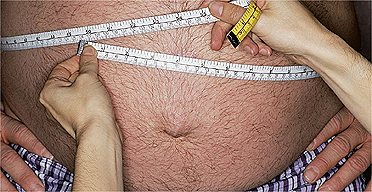
Britain's soaring rates of obesity are likely to trigger a new wave of cancer, with as many as 12,000 weight-related cases now expected every year by 2010, researchers warned yesterday. Obesity plays a role in nearly 4% of cancers, including breast and womb tumours, and is believed to be linked to others, such as bowel and kidney cancer. In most cases, hormones released from fat are responsible for raising the cancer risk.
Cancer specialists used the most recent figures on obesity from the Department of Health to calculate the number of people at risk of developing weight-related cancer. According to the health department figures, there were 24.2 million obese or overweight people in the UK in 2003, a number the department predicts will rise by 14% to 27.6 million by 2010.
Statisticians at Cancer Research UK calculated this would mean 1,500 extra cases of weight-related cancer a year by 2010. Researchers believe excess weight causes 3.8% of cancers. The projected rise in people becoming overweight or obese means that weight-related cancers are likely to rise from 10,500 cases a year to 12,000 in just seven years.
After smoking, obesity is considered one of the most important preventable causes of cancer, but a survey conducted by Cancer Research UK found that only 29% of overweight or obese people knew that being fat increases the risk.
Tim Key, an expert on cancer and diet at Cancer Research UK, said: "It is now well established that being overweight increases the risk of developing several types of cancer. The effects on breast and womb cancer are almost certainly due to the increased production of the hormone oestrogen in the fatty tissue. We are less sure of the precise mechanisms in other obesity-related cancers, but we can confidently predict that the number of these cases will increase unless the rise in obesity in Britain can be reversed."
Research in the US found that a body mass index (BMI) of between 30 and 35, the range classified as obese, increases the risk of dying from cancer by a third. A BMI of 25 to 29.9 is considered overweight and 18.5 to 24.9 as healthy. More than a fifth of men and a quarter of women in the UK are clinically obese and the number of obese children has tripled in the past 20 years. Obese people who develop cancer often have a lower chance of surviving because their excess weight makes early diagnosis difficult, so the disease is more advanced when diagnosed.
Britain is witnessing a long-term surge in other cancers. Malignant melanoma, a type of skin cancer, increased by 42% in men and 27% in women between 1993 and 2002, a rise largely attributed to tanning, while kidney cancer increased by 14% in men and 20% in women. Uterine cancer and breast cancer increased by 19% and 10% respectively. But stomach cancer cases fell by over 20% in men and women.

